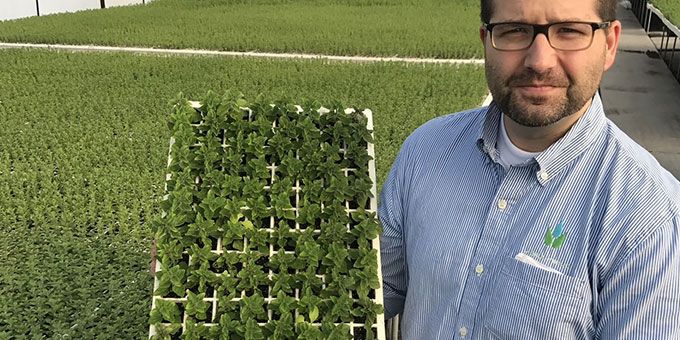On average our products provide a 3:1 ROI. Due to the economics of our tech-stack and products all forms of farming benefit with the use of Nanoliquid technology. In 2023, as commodity prices have somewhat softened our products have performed very well with Corn and Soybeans.
 The Use of Nanoliquid in Farming Applications
The Use of Nanoliquid in Farming Applications

Q&A with Clark Bell, President and CEO, | Aqua-Yield
Tell us about yourself and your role with Aqua-Yield.
I am one of the Co-Founders of the company, and as such, this company, after my family and faith, is my highest priority.
Can you talk to me about the relevance your family history played in developing the nanotech? Your website mentions that your grandfather bought land for farming with the aim of building revenue for future business—did you get first-hand insight into the need to make plants more durable and efficient?
Much of my identity, intellect, and thoughts are contributed to Nano-Yield.
Past my entrepreneurial spirit and ethos, in the company, my role is the Chief Executive Officer and President. As the leader of the company, my skillset is best for the company as I lead from the front, hit the road, meet with our customers, and find out ways that Nanotechnology can help the growers they serve. I love meeting farmers, walking fields, and presenting the company's collective vision on the future of agriculture.
I feel blessed that the company is in a position where I do not have to be in the office day-to-day, and I can focus on the vision, strategy, and building of the company.
Hands down, the management team of our company is the industry standard, and I would put our management against any other startup ag input company.
Is your company self-funded?
We bootstrapped from 2014-2022. During that time, we lived off of cash-flow or short-term loans from our initial shareholders. As we grew, we had many Venture capital, Private Equity or Strategics reach out to us to take investment or sell a minority or all of the company. None of them felt right to our ownership group until we met an inflection point where we needed capital to help us get to the next level. In August of 2022 we closed a Series A round led by Larry H. Miller companies with investment from Penny Newman Grain Co. and JH Partners.
Tell us about nanoliquid and what farming applications are best for your technology?
Simply stated Nanoliquid technology is a delivery system in the form of a liquid ag input. If you want your current nutrition or pesticide program to work more efficiently without breaking the bank then we are the answer. Our customers tell us our products drive nutrition to the next level and guarantee faster up-take for herbicides and fungicides. On average our products provide a 3:1 ROI. Due to the economics of our tech-stack and products all forms of farming benefit with the use of Nanoliquid technology. In 2023, as commodity prices have somewhat softened our products have performed very well with Corn and Soybeans.
What other sectors or markets will your company pursue for future growth?
In 2023, we launched a Pro Turf (Golf/Sports Field/Managed Natural Grass) line utilizing the same tech stack in our Nano-Yield product mix but blended and delivered for Turf Professionals. That brand is called Turf Nano Tech and as word spreads about the technology and results it will be a head turner.
We are heavily focused in expanding internationally. In 2023 we have licensed our technology in Bangladesh and India. Additionally we have setup or are in the process of setting up distribution throughout Latin America. We are very excited about LatAm and the Asian markets as NLT products have a unique fit.
Look down the road a few years, where do you see Aqua-Yield and the global fertilizer market?
By 2027 our big hairy audacious goal is to be the household brand that when people think of the most cutting-edge delivery input, they think of us. I believe by then we will have over 100 employees and have operations in over 50 countries. The future is bright for Nano.

About Clark T. Bell
Clark T. Bell discovered entrepreneurship by trading and selling baseball cards in junior high. At age 15, Clark had built a successful business replacing people’s lawns with new sod. He also sold sweatshirts he’d printed at the high school cafeteria. From there, he built a successful valet parking service and digital marketing agency before co-founding Aqua-Yield with Mike Bullock and his dad, Warren Bell. Clark has enjoyed creating an innovative nanoliquid product line and building a talented team of industry experts. He is a devoted husband and father of four and an outdoorsman. Clark enjoys skiing, fly fishing, RV camping and coaching his kids’ sports teams. He studied business administration at Westminster College in Salt Lake City and is an adjunct professor in digital marketing at the University of Utah.
The content & opinions in this article are the author’s and do not necessarily represent the views of AgriTechTomorrow
Comments (0)
This post does not have any comments. Be the first to leave a comment below.
Featured Product


